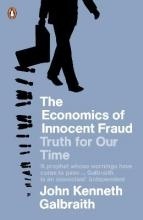The Economics of Innocent Fraud

Editorial Penguin UK
Fecha de edición septiembre 2010
Idioma inglés
EAN 9780141045139
80 páginas
Libro
Dimensiones 129 mm x 198 mm
Resumen del libro
First published in 2004, John Kenneth Galbraith's The Economics of Innocent Fraud is an extraordinarily prescient analysis of capitalism that has even greater power and relevance for our times.
In this vigorous polemic John Kenneth Galbraith, a lifelong critic of unbridled corporate power, distils years of expertise to deliver a scathing attack on the modern financial system.
Sounding the alarm on the gap between 'conventional wisdom' - a phrase he coined - and reality, Galbraith warns that the private sector and the public realm are becoming increasingly intertwined. He shows how politics and the media have colluded in the myth of a benign market system, accepting obscene pay gaps and unrestrained self-enrichment - ultimately meaning that we have come to condone legal, legitimate, 'innocent' fraud.
'An almost indecently pleasurable read'
The Times
'I agree with Galbraith. The bonus culture is skim, bribery, corporate theft'
Simon Jenkins, Guardian
'The most stylish writer on economics of the past half-century ... it will please those who appreciate Galbraith's dry wit and laconic iconoclasm'
Financial Times
'America's great liberal economist, the intellectual heir to John Maynard Keynes'
Economist
John Kenneth Galbraith (1908-2006) was a Canadian-American economist. A Keynesian and an institutionalist, Galbraith was a leading proponent of 20th-century American liberalism and progressivism. Galbraith was the author of 30 books, including The Economics of Innocent Fraud, The Great Crash: 1929, and A History of Economics. He was awarded honorary degrees from Harvard, Oxford, the University of Paris and Moscow University.
Biografía del autor
Uno de los economistas más brillantes e influyentes del siglo XX, fue profesor de economía en las universidades de California, Princeton, Cambridge, Bristol y Harvard. Su mayor preocupación no era el análisis econométrico o la teoría económica sino analizar las consecuencias de la política económica en la sociedad, de forma accesible y eliminando gran parte del tecnicismo propio de los economistas. Desempeñó cargos públicos desde la época de la segunda guerra mundial, bajo el mandato de Franklin D. Roosevelt, y fue nombrado por John F. Kennedy embajador de los Estados Unidos en la India. Entre sus obras destacanLa sociedad opulenta,El crash de 1929,Historia de la economía,Breve historia de la euforia financierayLa cultura de la satisfacción, todos ellos publicados en Ariel.








